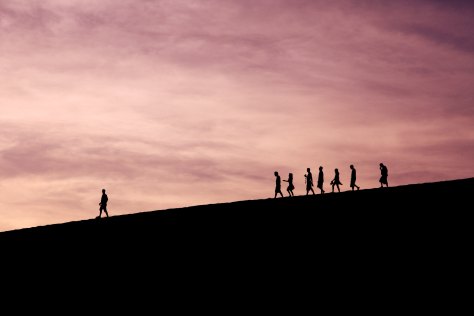“And the waters returned from off the earth continually: and after the end of the hundred and fifty days the waters were abated”
(Gen. 8:3 KJV).
150 days. Perhaps this seems like a lot of days because I’m young, but I’m sure even the older and wiser readers out there would still think it a lot of days if they didn’t know when the end date would be.
And I’d imagine that it would’ve been a long time for Noah, too.
I mean, think about it. You’re in an ark until the earth is dry again, but God didn’t tell you when that would be.
You don’t know how long you’re going to be stuck in a safe—but smelly—ocean zoo. You don’t know how long your food will last. And you don’t know how long your world will keep rocking to and fro to who knows where.
And honestly, you’re getting tired of your family. They’re probably complaining by now, they’re insecure of their futures, and it’s starting to get easier and easier to forget that this was God’s escape plan for all of you.
I’ve been in a similar spot recently. Not in nearly as dramatic of a fashion, of course, but I’ve been wondering how long the stress of growing up will last, how long the job-hunt will last, and how long before I feel safe with where I’m at in life.
You know, just the typical struggles of a college graduate who wants to keep up with her perception of how successful her peers will be by now.
But that’s the thing. I was measuring success by the world’s standards and coming up with my own timeline of how my future would play out. And that was never God’s plan. God’s plan was for me to be as responsible as I can be and let Him take care of my future.
Of course, I don’t know when my own trials will pass, but I can know when my worries will end if I remember how good God’s been to me.
And I may not know in exactly what ways God plans to use me for His glory, but I know that He had a plan when He gave me my talents, when He led me to study Professional Writing, and when He got me through all my classes.
That means that, despite how short-sighted I feel right now, God has long-range vision and can see all my life and all His plans for me. He’s not stuck in the present like I am.
And who knows, maybe I’m closer to the end of my own 150 days (or however long my waiting time is) than I thought.
That’s why it’s important for us to never forget that:
1. God remembers you when you’re facing trials.
The first verse of Genesis 8 starts with the words, “And God remembered Noah, and every living thing.”
However, it’s important to note that God never forgot you. He didn’t sleep through an alarm clock or lose a sticky note. Instead, the Bible uses remembered here means “to mark,” “to mention,” or “to record.”
He never forgets you or me. Instead, He waits until it’s time to mark a change in our lives.
Even when it seems like we’re surrounded by tribulation, God is still working in us to help us develop virtues and reject the vices still residing in us (Jam. 1:12, Rom. 5:3-5). God never leaves an opportunity wasted (so long as we get with the program).
Trials can vary from nuisances to life calamities, but if we start seeing them as opportunities to practice virtues like patience and faith, we’ll always be stronger at the other end of our trials.
2. God restrains the intensity of your trials.
The Bible records that “the fountains also of the deep and the windows of heaven were stopped, and the rain from heaven was restrained” (Gen. 8:2, emphasis mine).
These actions are written in the passive tense, but that doesn’t mean there wasn’t an agent doing the actions.
So we must ask ourselves some questions. Who stopped the springs in the deeps from pouring out their water? Who stopped the heavens from wringing themselves dry? And who restrained (or forbid by act or word) the greatest flood the world has ever seen?
God did.
And He’s so powerful that He barely spent any time talking about it before moving on to Noah’s clever use of a dove to figure out how wet or dry the land was.
It’s special when humans are clever, but when God is strong, wise, and efficient, well, it’s just another day in the life of God. And that’s why the Bible tells us to rest in His strength and not our own (Jer. 17:5-10).
3. God assuages the power of your trials.
Of course, God’s restraining didn’t mean that the waters were immediately assuaged. It just meant that the flood’s apex passed.
We can liken this to times in our lives when the trials have stopped increasing in their intensity. For example, Job’s apex would be when he’d already lost everything, got horribly sick, and his friends revealed themselves to be fools.
That didn’t mean things got immediately better, though. His trial was prolonged, just as Noah’s was and just as ours may be.
But God knows how much we can handle, so let’s not worry. God is with us! We can lean on Him during the storm and know that eventually, the waters will die down.
4. God leads you out of your trials.
We don’t have to steer this ship on our own. Sure, God expects us to keep moving. After all, Noah was coming up with clever ways to use birds to figure out a bit more about the state of the land. But when it came time for them to leave the ark, God spoke (Gen. 8:15).
And God didn’t just say, “You can come out now.” His instructions for Noah to guide every man and beast out of the ark were only the beginning (Gen. 8:16-17).
God also told Noah that humanity and the animal world would need to multiply, because as lords over the animals, they would be responsible to take care of the more tame creatures (like sheep). Basically, God told them to rule the earth, and to rule it well.
This tells us that principle of keeping (or stewarding) the earth didn’t end with Adam and Eve, but continues on with Noah and with all of us who came after. This instruction from God, like all biblical principles, is God’s way of leading us in His will.
And just as Noah obeyed God’s leading, we should obey, too.
5. God comforts you after your trials.
When we think of the account of Noah, we do not usually come away with a fear that God will again flood the earth. Although we know that God can still judge the earth and we know to fear Him for His great power, we are typically aware that nothing of that magnitude will ever happen again–at least not until the end times. But that’s because we know that God closes that chapter with a rainbow.
Noah didn’t have the benefit of hindsight.
Think about it from his perspective. You’ve been in a smelly ark for months, you’re probably starting to get claustrophobic (if you haven’t already), and you long to see land again instead of getting carried along by the waters to who-knows-where.
You’ve also seen many people die in one go, probably screaming in fear before their inevitable drowning. Sure, they hated the very sight of you since your existence rebuked their corrupt lifestyles, but that doesn’t mean you wanted to see them go under. You know that this is God’s justice, but that doesn’t mean it makes you happy and warm inside.
And now God tells you to bring all life with you and prosper, and you’re thinking that this means that He does want to keep life on earth thriving. But you don’t know how messed up your grandchildren will be. You don’t know how long it will take for people to the same level of corruption that tested God’s patient and long-suffering nature.
You make a sacrifice to God, taking from EVERY clean beast (Gen 8:19-20). You know you’re not perfect either, after all, and that the reason that you and your family are still alive has more to do with God’s mercy than your righteousness.
Now that you understand Noah’s perspective, maybe you can appreciate God’s promise. God is omniscient, so He knew that Noah needed security. And not just any kind of security, but an everlasting covenant.
Scripture is full of promises, but they’re not all the same. Some apply to this life, and others to the life to come. Some are small, and others are big. And some are conditional on a person’s obedience to a biblical principle, while others are unconditional.
And in honor of Noah’s very real human fears and his sacrificial giving, God made a monumental, unconditional promise to never destroy the earth to the extent of causing a global flood again (Gen. 8:21-22). We know it’s an unconditional promise because He says that, although “the imagination of man’s heart is evil from his youth,” He will keep His promise (Gen. 8:21).
So even if men reach the pre-flood heights of evil again, God won’t destroy them in a global manner again as long as the earth remains (Gen. 8:21-22).
God is more aware of our needs than we give Him credit for. He knows our limits, our fears, and our hopes. Let’s not forget to come to Him for comfort.
On a more practical level, how can we accept His comfort if we kill our line of communication with Him by forgetting to honestly speak to Him in prayer and by ignoring what He has to say to us in His Word?
Let me encourage you to trust God with your troubles and to come to Him when life gets difficult. Because if you do, you’ll come out closer to God and stronger in your faith when you’re leaving the trial than when you came into it.
Come back next week for a study on Genesis 9, the next chapter in the Genesis series! And subscribe to get notified every time I post! God bless!





Wow! So encouraging Pam, thank you for sharing your heart and thoughts. Your article encourages me to faithfully wait my 150 days of trials knowing that God will open the door of deliverance in due time. Blessings
LikeLiked by 1 person
Thank you! It’s awesome to remember that God is always with us 🙂
LikeLike
I thank God for giving you Pam this amazing talent of writing for Him and edify in this way those who know Him and also those who are looking for confort in their busy or troubling life.
LikeLiked by 1 person
Thank you so much for your encouraging words! I’m glad that God is using this ministry to bless you!
LikeLike